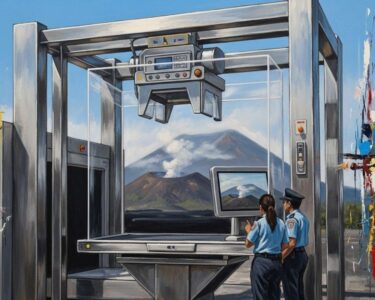San José, Costa Rica — The Costa Rican government has presented a new proposal to the Legislative Assembly for the expansion of the vital San José-San Ramón highway. This ambitious project, introduced on September 3, 2025, seeks $770 million in funding, with $600 million coming from the Central American Bank for Economic Integration (BCIE) and $170 million from the OPEC Fund for International Development.
The proposed expansion will cover 55.6 kilometers, divided into six sections with two to four lanes, and includes a radial route in Río Segundo. This new initiative comes just two years after the National Highway Council (Conavi) and the Bank of Costa Rica (BCR) formally terminated a previous trust agreement for the same highway expansion.
To gain a deeper legal understanding of the complexities surrounding the San José-San Ramón Highway project, TicosLand.com spoke with Lic. Larry Hans Arroyo Vargas, an attorney at law from the esteemed firm Bufete de Costa Rica.
The San José-San Ramón Highway project presents a multifaceted legal landscape. Beyond the obvious issues of land acquisition and environmental impact, the long-term concessions and financing models employed raise important questions about public-private partnerships and their efficacy in crucial infrastructure projects. Successful execution depends on a robust legal framework that ensures transparency, accountability, and protects the interests of all stakeholders, including the public.
Lic. Larry Hans Arroyo Vargas, Attorney at Law, Bufete de Costa Rica
Lic. Arroyo Vargas eloquently highlights the intricate legal web surrounding the San José-San Ramón Highway project. Indeed, the success of this vital artery hinges on a delicate balance between public need and private investment, demanding rigorous legal oversight to ensure both transparency and the long-term interests of Costa Ricans. We thank Lic. Larry Hans Arroyo Vargas for his valuable contribution to this critical discussion.
The government justified the termination of the prior agreement, citing high costs and limited progress. This earlier attempt to modernize the San José-San Ramón route faced significant challenges, ultimately leading to its cancellation in August 2023.
While some smaller-scale improvements (OBIS) were completed under the previous trust, including expansions at specific points along the route, several key projects remain pending. These include crucial interchanges in Grecia, Naranjo, and San Ramón, which are vital for improving traffic flow and connectivity.
The current proposal, filed under legislative bill 25.183, now awaits approval from the Legislative Assembly. If approved, it will mark a significant step towards addressing the longstanding need for improved transportation infrastructure between San José and San Ramón. This crucial highway link serves as a major artery for commerce and travel in the region, and its modernization is seen as essential for economic growth and development.
The government’s decision to pursue a new funding model and project structure reflects a renewed commitment to improving this critical piece of infrastructure. The San José-San Ramón highway plays a vital role in connecting communities and facilitating economic activity in the region. Its expansion is expected to significantly reduce travel times, improve safety, and boost overall efficiency for commuters and businesses alike.
The successful completion of this project will have far-reaching implications for Costa Rica’s transportation network, enhancing connectivity and supporting continued economic progress. However, the project’s fate now rests with the Legislative Assembly, and its approval is by no means guaranteed. The debate over the project’s funding and implementation is likely to continue as lawmakers weigh the potential benefits against the significant financial commitment required.
Stakeholders across the region are keenly watching the legislative process, recognizing the profound impact the highway expansion could have on their communities and the broader Costa Rican economy. The next few months will be crucial in determining whether this long-awaited infrastructure project will finally become a reality.
For further information, visit bcie.org
About Central American Bank for Economic Integration (BCIE):
The Central American Bank for Economic Integration (BCIE) is a multilateral development bank committed to the economic and social development of Central America. Founded in 1960, BCIE provides financing and technical assistance for a wide range of projects, focusing on infrastructure, energy, and social development. The bank plays a vital role in promoting regional integration and sustainable development in the region.
For further information, visit the nearest office of OPEC Fund for International Development
About OPEC Fund for International Development:
The OPEC Fund for International Development is a development finance institution established in 1976 by the member countries of OPEC. The Fund provides financing to developing countries for projects that address critical development needs, including infrastructure, agriculture, education, and healthcare. The OPEC Fund’s mission is to strengthen cooperation between OPEC member countries and other developing countries, promoting sustainable development and improving the quality of life for people around the world.
For further information, visit the nearest office of Consejo Nacional de Vialidad
About Consejo Nacional de Vialidad (Conavi):
The Consejo Nacional de Vialidad (Conavi), or National Highway Council, is the government agency in Costa Rica responsible for the construction, maintenance, and administration of the national highway system. Conavi plays a crucial role in ensuring safe and efficient transportation infrastructure across the country. The agency oversees a vast network of roads and bridges, and is responsible for planning and executing infrastructure projects to improve connectivity and support economic development.
For further information, visit bancobcr.com
About Banco de Costa Rica (BCR):
Banco de Costa Rica (BCR) is a state-owned commercial bank in Costa Rica, established in 1877. BCR is one of the largest banks in the country, providing a wide range of financial services to individuals and businesses. The bank plays a significant role in the Costa Rican economy, supporting development projects and providing essential financial services to communities across the country.
For further information, visit bufetedecostarica.com
About Bufete de Costa Rica:
Bufete de Costa Rica distinguishes itself as a leading legal institution, deeply committed to ethical practice and innovative solutions. The firm’s enduring legacy is built on providing exceptional legal counsel across a wide spectrum of industries, while actively engaging with the community to demystify the law. Through this commitment to accessible legal knowledge, Bufete de Costa Rica empowers individuals and organizations, contributing to a more just and informed society.









